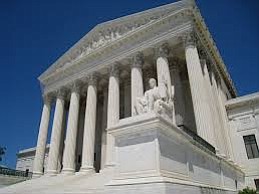The Senate and the next Supreme court justice: What you need to know
CNN/Stylemagazine.com Newswire | 6/28/2018, 1:56 p.m.
By Manu Raju, Phil Mattingly and Ashley Killough, CNN
(CNN) -- Supreme Court Justice Anthony Kennedy announced his retirement Wednesday, and almost immediately the US Senate was launched into the national spotlight as it's the legislative body that will formally confirm whoever the next justice will be.
Here's what you need to know:
When will the confirmation process happen?
Senate Majority Leader Mitch McConnell has repeatedly said a vote will happen this fall. They're not waiting until after the midterms, despite the fact that the Kentucky Republican waited for 2016 to end before holding a confirmation vote on the seat vacated by the late Justice Antonin Scalia.
Why won't he wait?
Republicans see this as an entirely different situation. This vacancy is happening in the middle of the President's first-term, not at the end of a President's second term.
"These aren't the final months of a second-term constitutionally lame duck presidency with a presidential election fast approaching," McConnell said on the floor Thursday morning.
"Not gonna happen," said Texas Sen. John Cornyn, the No. 2 Republican in the chamber. "We'll have the same President," so the comparison to the transition from Obama to Trump doesn't work, he added.
When pressed on how the Senate could look different because of the midterms, Cornyn pushed back. "Yes and the Earth could end tomorrow," he said. "It's not a good excuse for not doing our work."
Democrats are obviously livid about this, but, much to their chagrin, there's nothing they can do.
The math
The current breakdown in the Senate is 51 Republicans to 49 Democrats. With Arizona Republica Sen. John McCain out, that brings it down to 50-49, which means Republicans can't afford to lose a single vote.
If any Democrats decide to vote with them, only then could Republicans afford to start losing some of their own.
But what about a filibuster?
That doesn't matter anymore. During the Gorsuch confirmation, Republicans weren't getting enough Democrats to side with them and get the 60 votes needed to avoid a filibuster. So McConnell decided to go nuclear and change the rules so that Supreme Court nominees needed 50 votes.
It was a huge deal at the time -- and still is -- but it was also seen as a retaliatory move, since Democrats had done the same thing a few years earlier with other executive branch nominees.
Whom to watch
On the Republican side, all eyes are on moderates Sen. Lisa Murkowski of Alaska and Sen. Susan Collins of Maine. We've already seen the power they can have in derailing GOP efforts, like when they helped take down a major health care vote last year, with McCain at their side.
Murkowski and Collins both support abortion rights, so if Roe v. Wade becomes a big issue in this confirmation battle, that could turn the two of them off.
Collins said Wednesday it was her "preference" to nominate someone like Kennedy, who was a swing vote on the high court.
"One of the things I most admire about him is that he did not view cases through an ideological lens but rather based on the law, the merits and the Constitution," Murkowski said.
That brings us to another point: Like Collins said, many senators, especially Democrats, will be looking for a nominee who falls more in the middle in the ideological spectrum to replace Kennedy, since that is the role he played on the court as a key swing vote. Gorsuch was replacing Scalia, a conservative justice, so it wasn't such a big deal that Gorsuch was considered conservative. Picking a conservative to replace Kennedy could solidify the court as a right-leaning body for years to come.
Whom to watch, part 2
If Collins and Murkowski start to fade, all eyes will be on Democrats from red states who are up for re-election this year and facing enormous pressure back home. It could help them immensely for Trump to pick a more moderate nominee, but if he goes with a hardline conservative or a wild card, that would make it really tough for these Dems to sign on.
In the Gorsuch confirmation, three of these Democrats (Sens. Joe Manchin of West Virginia, Heidi Heitkamp of North Dakota, and Joe Donnelly of Indiana) supported Gorsuch, but there's no guarantee they'll back Trump's pick this time around.
Along with those three, it's also worth keeping an eye on seven other Democrats who are running for re-election in states that Trump won. They include:
Sen. Claire McCaskill of Missouri
Sen. Bill Nelson of Florida
Sen. Debbie Stabenow of Michigan
Sen. Bob Casey of Pennsylvania
Sen. Tammy Baldwin of Wisconsin
Sen. Sherrod Brown of Ohio
Sen. Jon Tester of Montana
Of this group, GOP aides have their eyes primarily on McCaskill and Nelson, both of whom are tied in exceedingly tight races.
Conservative groups spent millions on ads lobbying these senators to back Gorsuch last year, but only Manchin, Heitkamp and Donnelly ultimately backed him.
But, as we mentioned before, this is now a court swinging, court defining pick. So several aides say it won't necessarily be viewed through the same vein Gorsuch was, when it was a conservative filling a conservative seat. So the pressure wasn't nearly as high on these red state Democrats.









